【单元考点培优】Unit 1 The Changing World 专题07 句型转换(含答案解析)-2025-2026学年九年级英语上册单元复习考点培优仁爱科普版
文档属性
| 名称 | 【单元考点培优】Unit 1 The Changing World 专题07 句型转换(含答案解析)-2025-2026学年九年级英语上册单元复习考点培优仁爱科普版 | 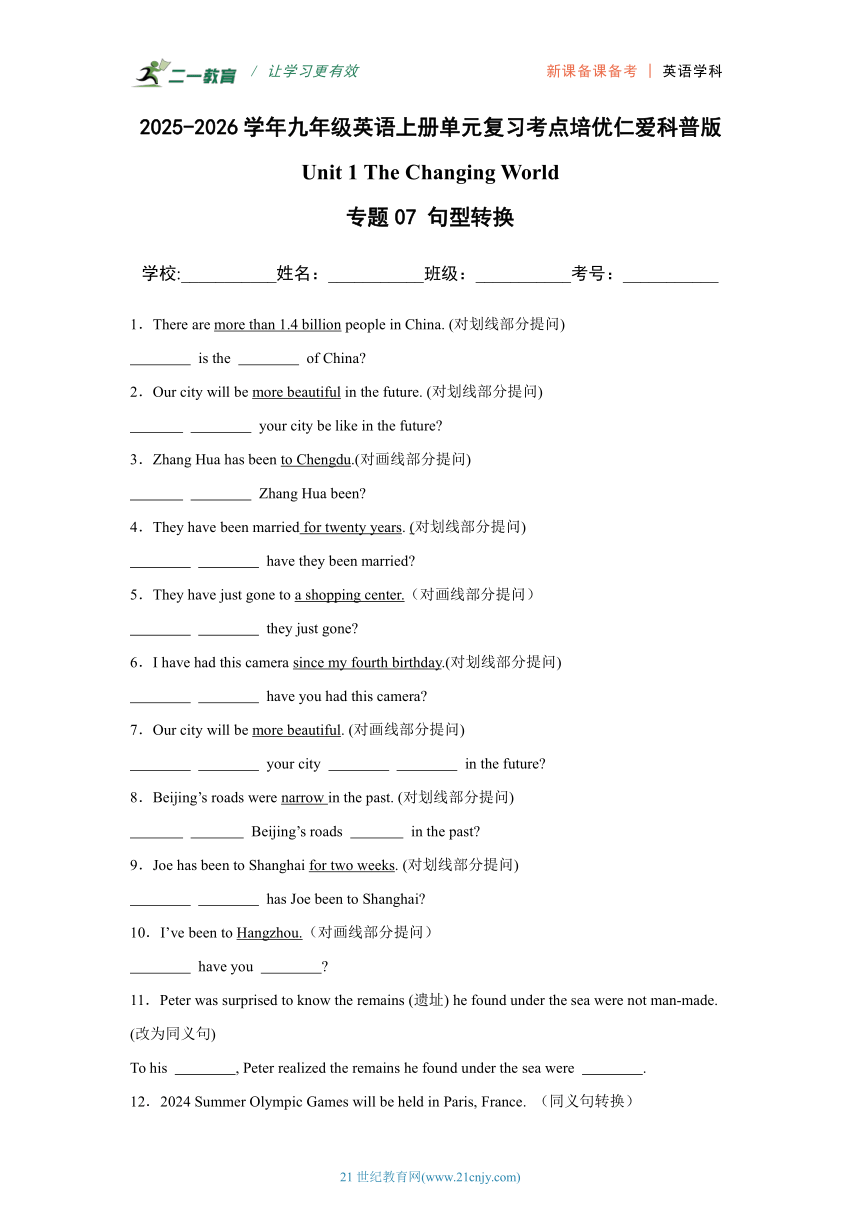 | |
| 格式 | docx | ||
| 文件大小 | 64.0KB | ||
| 资源类型 | 试卷 | ||
| 版本资源 | 仁爱科普版 | ||
| 科目 | 英语 | ||
| 更新时间 | 2025-08-05 09:34:59 | ||
图片预览

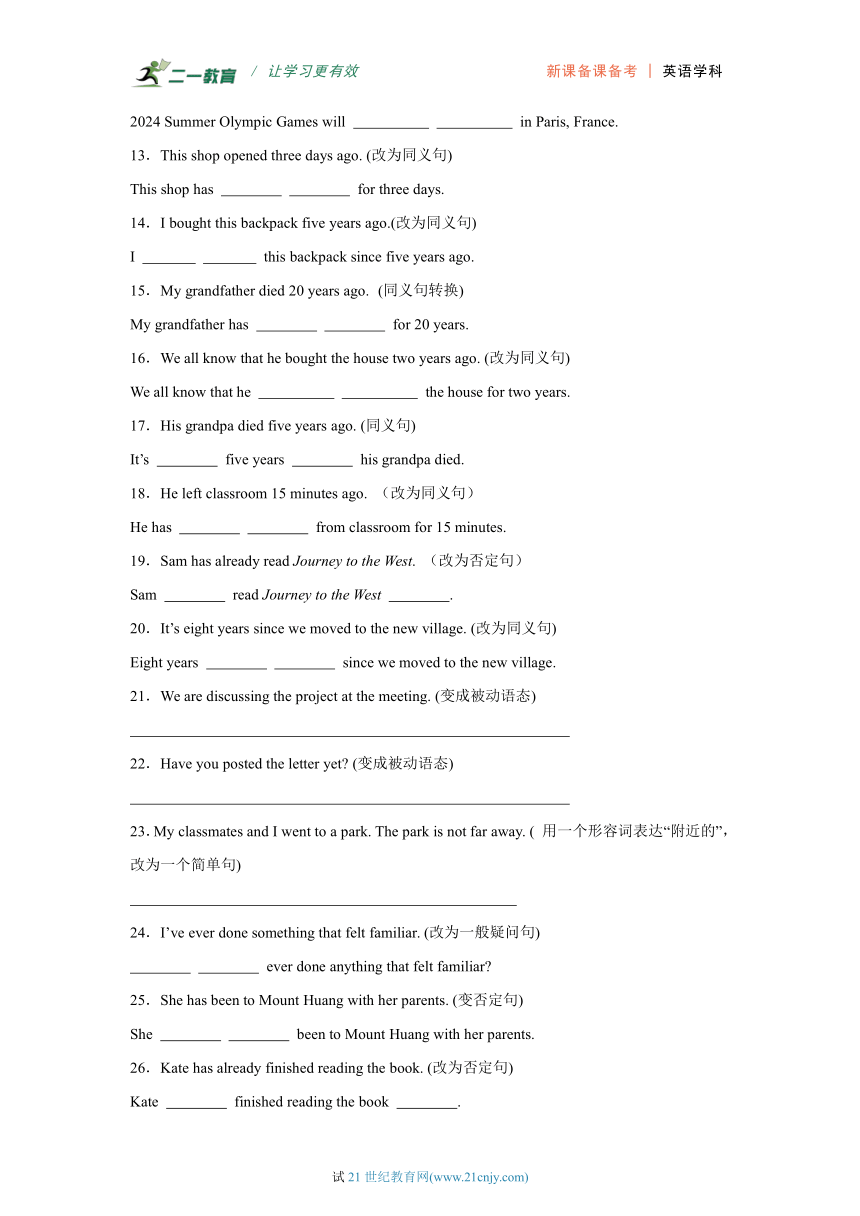
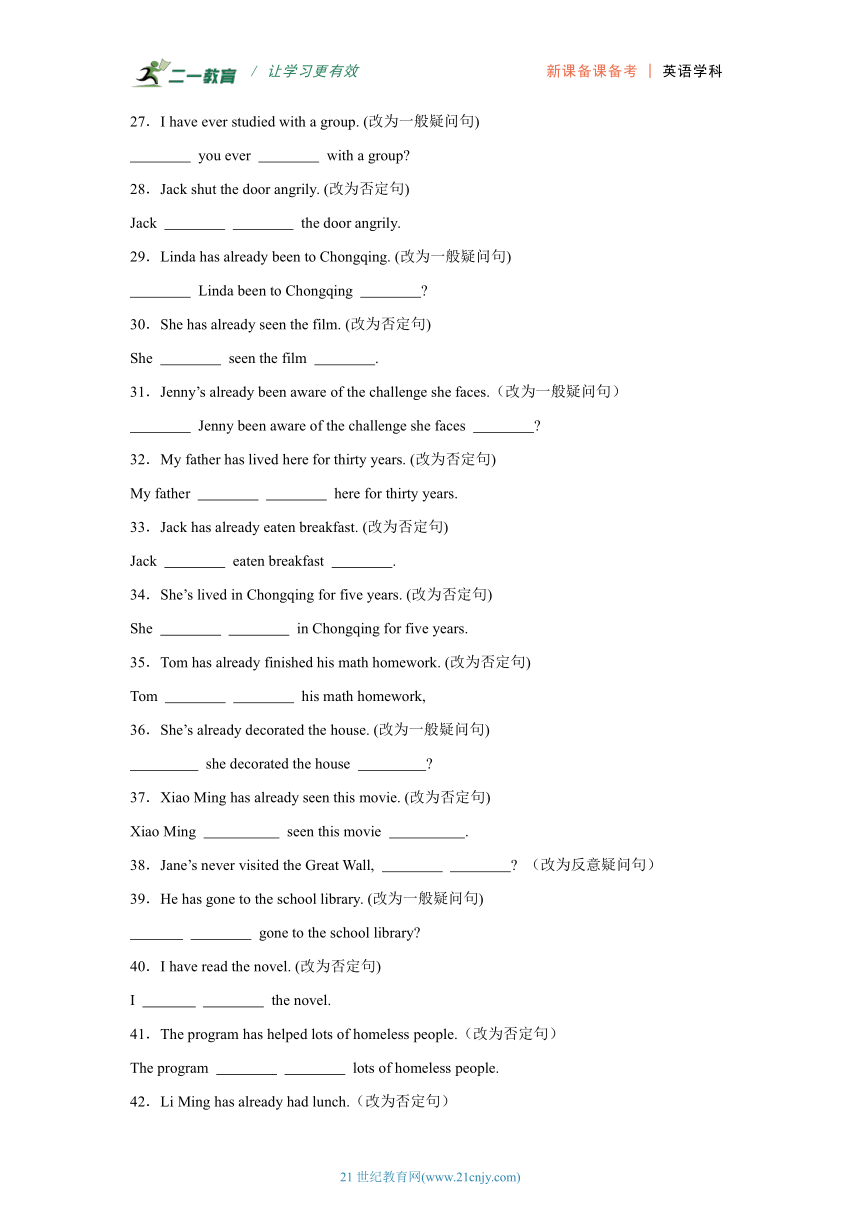
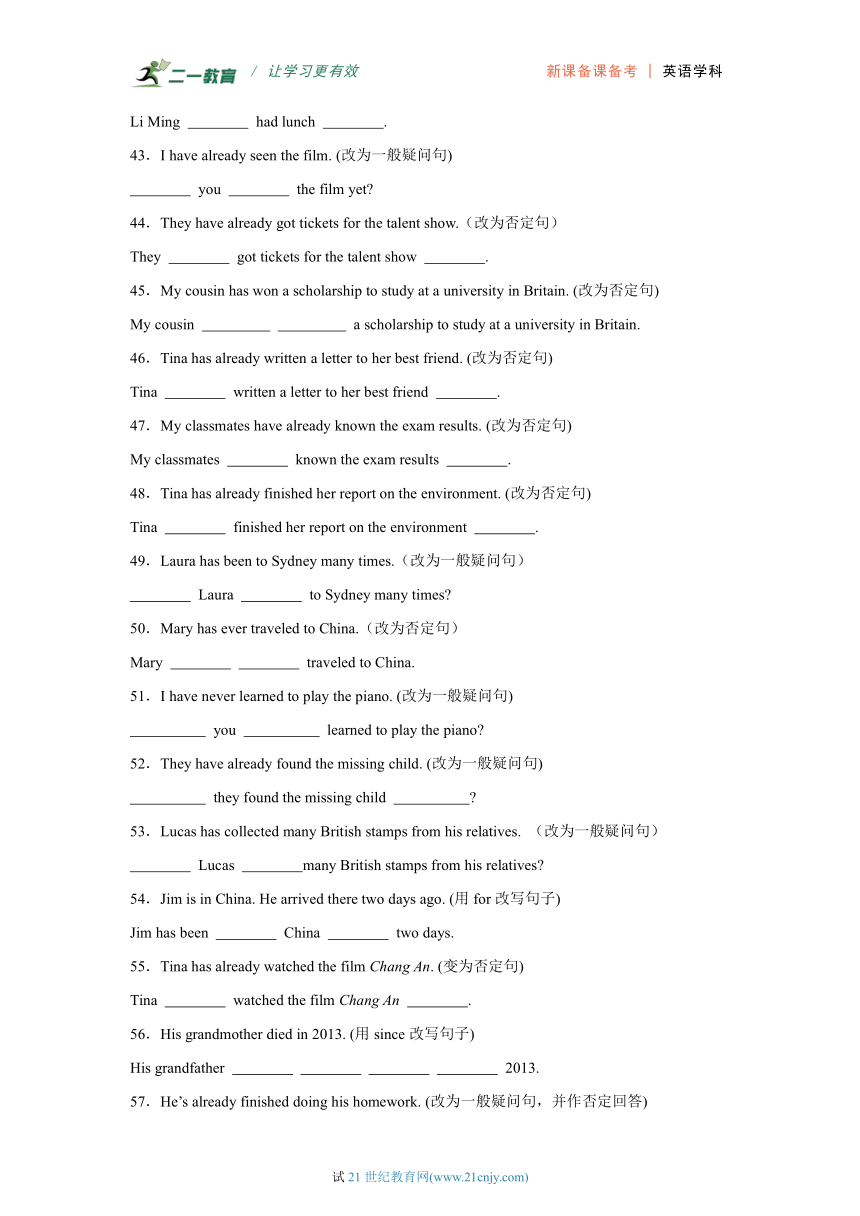
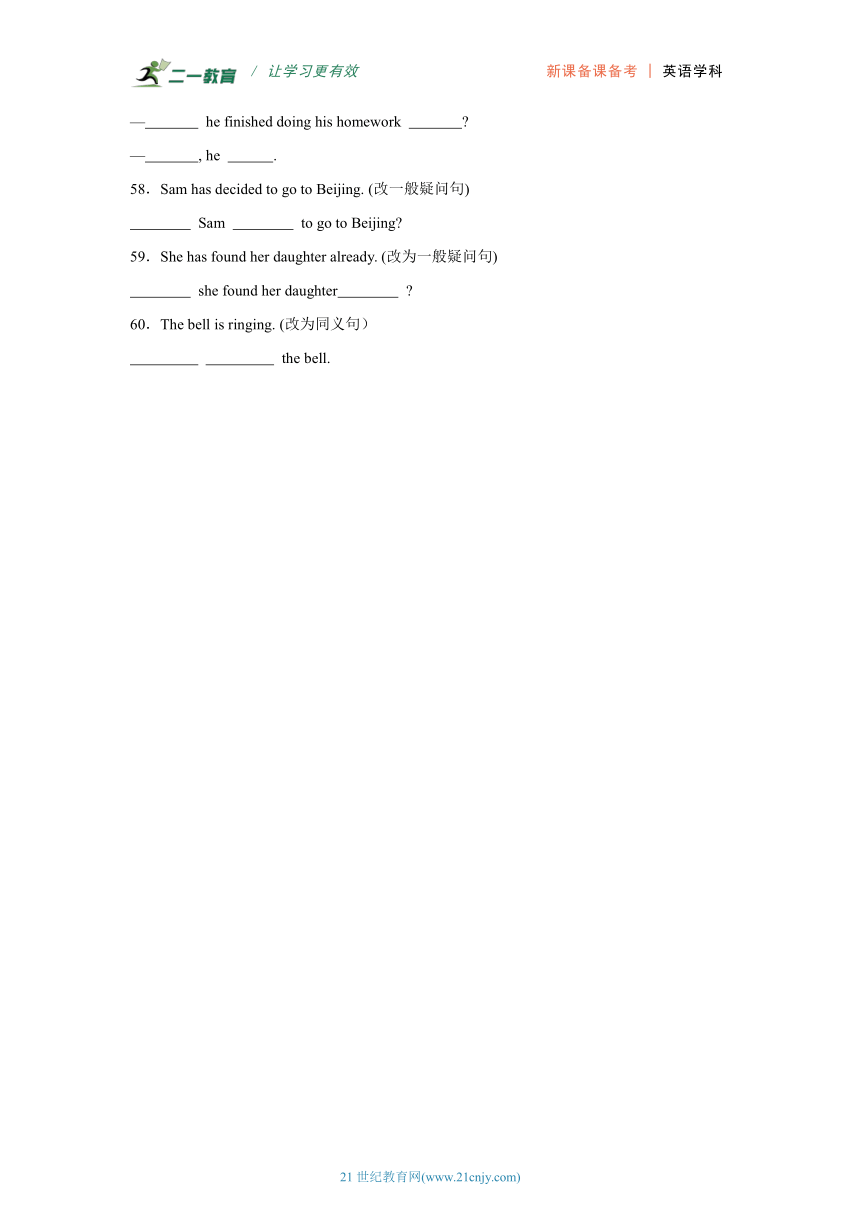
文档简介
2025-2026学年九年级英语上册单元复习考点培优仁爱科普版Unit 1 The Changing World
专题07 句型转换
学校:___________姓名:___________班级:___________考号:___________
1.There are more than 1.4 billion people in China. (对划线部分提问)
is the of China
2.Our city will be more beautiful in the future. (对划线部分提问)
your city be like in the future
3.Zhang Hua has been to Chengdu.(对画线部分提问)
Zhang Hua been
4.They have been married for twenty years. (对划线部分提问)
have they been married
5.They have just gone to a shopping center.(对画线部分提问)
they just gone
6.I have had this camera since my fourth birthday.(对划线部分提问)
have you had this camera
7.Our city will be more beautiful. (对画线部分提问)
your city in the future
8.Beijing’s roads were narrow in the past. (对划线部分提问)
Beijing’s roads in the past
9.Joe has been to Shanghai for two weeks. (对划线部分提问)
has Joe been to Shanghai
10.I’ve been to Hangzhou.(对画线部分提问)
have you
11.Peter was surprised to know the remains (遗址) he found under the sea were not man-made. (改为同义句)
To his , Peter realized the remains he found under the sea were .
12.2024 Summer Olympic Games will be held in Paris, France. (同义句转换)
2024 Summer Olympic Games will in Paris, France.
13.This shop opened three days ago. (改为同义句)
This shop has for three days.
14.I bought this backpack five years ago.(改为同义句)
I this backpack since five years ago.
15.My grandfather died 20 years ago. (同义句转换)
My grandfather has for 20 years.
16.We all know that he bought the house two years ago. (改为同义句)
We all know that he the house for two years.
17.His grandpa died five years ago. (同义句)
It’s five years his grandpa died.
18.He left classroom 15 minutes ago. (改为同义句)
He has from classroom for 15 minutes.
19.Sam has already read Journey to the West. (改为否定句)
Sam read Journey to the West .
20.It’s eight years since we moved to the new village. (改为同义句)
Eight years since we moved to the new village.
21.We are discussing the project at the meeting. (变成被动语态)
22.Have you posted the letter yet (变成被动语态)
23.My classmates and I went to a park. The park is not far away. ( 用一个形容词表达“附近的”,改为一个简单句)
24.I’ve ever done something that felt familiar. (改为一般疑问句)
ever done anything that felt familiar
25.She has been to Mount Huang with her parents. (变否定句)
She been to Mount Huang with her parents.
26.Kate has already finished reading the book. (改为否定句)
Kate finished reading the book .
27.I have ever studied with a group. (改为一般疑问句)
you ever with a group
28.Jack shut the door angrily. (改为否定句)
Jack the door angrily.
29.Linda has already been to Chongqing. (改为一般疑问句)
Linda been to Chongqing
30.She has already seen the film. (改为否定句)
She seen the film .
31.Jenny’s already been aware of the challenge she faces.(改为一般疑问句)
Jenny been aware of the challenge she faces
32.My father has lived here for thirty years. (改为否定句)
My father here for thirty years.
33.Jack has already eaten breakfast. (改为否定句)
Jack eaten breakfast .
34.She’s lived in Chongqing for five years. (改为否定句)
She in Chongqing for five years.
35.Tom has already finished his math homework. (改为否定句)
Tom his math homework,
36.She’s already decorated the house. (改为一般疑问句)
she decorated the house
37.Xiao Ming has already seen this movie. (改为否定句)
Xiao Ming seen this movie .
38.Jane’s never visited the Great Wall, (改为反意疑问句)
39.He has gone to the school library. (改为一般疑问句)
gone to the school library
40.I have read the novel. (改为否定句)
I the novel.
41.The program has helped lots of homeless people.(改为否定句)
The program lots of homeless people.
42.Li Ming has already had lunch.(改为否定句)
Li Ming had lunch .
43.I have already seen the film. (改为一般疑问句)
you the film yet
44.They have already got tickets for the talent show.(改为否定句)
They got tickets for the talent show .
45.My cousin has won a scholarship to study at a university in Britain. (改为否定句)
My cousin a scholarship to study at a university in Britain.
46.Tina has already written a letter to her best friend. (改为否定句)
Tina written a letter to her best friend .
47.My classmates have already known the exam results. (改为否定句)
My classmates known the exam results .
48.Tina has already finished her report on the environment. (改为否定句)
Tina finished her report on the environment .
49.Laura has been to Sydney many times.(改为一般疑问句)
Laura to Sydney many times
50.Mary has ever traveled to China.(改为否定句)
Mary traveled to China.
51.I have never learned to play the piano. (改为一般疑问句)
you learned to play the piano
52.They have already found the missing child. (改为一般疑问句)
they found the missing child
53.Lucas has collected many British stamps from his relatives. (改为一般疑问句)
Lucas many British stamps from his relatives
54.Jim is in China. He arrived there two days ago. (用for改写句子)
Jim has been China two days.
55.Tina has already watched the film Chang An. (变为否定句)
Tina watched the film Chang An .
56.His grandmother died in 2013. (用since改写句子)
His grandfather 2013.
57.He’s already finished doing his homework. (改为一般疑问句,并作否定回答)
— he finished doing his homework
— , he .
58.Sam has decided to go to Beijing. (改一般疑问句)
Sam to go to Beijing
59.She has found her daughter already. (改为一般疑问句)
she found her daughter
60.The bell is ringing. (改为同义句)
the bell.
/ 让学习更有效 新课备课备考 | 英语学科
/ 让学习更有效 新课备课备考 | 英语学科
参考答案及试题解析
1.What population
【解析】句意:中国有超过14亿人口。划线部分是人口数量,询问人口的多少可用结构:What is the population of…。故填What;population。
2.What will
【解析】句意:我们的城市在将来会更加美丽。划线部分“more beautiful”是形容词比较级,在句中作表语,表示城市将来的“面貌”;原句是一般将来时“will do”,此时的疑问句可用句式what will…be like“……将会变得怎么样”。故填What;will。
3.Where has
【解析】句意:张华去过成都。对地点进行提问用特殊疑问词where,句首字母大写,疑问词后面跟一般疑问句语序,has提前构成一般疑问句。故填Where;has。
4.How long
【解析】句意:他们已经结婚20年。划线部分是一段时间,是对时间段提问,用疑问词how long,意为“多久”,故填How;long。
5.Where have
【解析】句意:他们刚去了购物中心。画线部分是地点,对地点提问用where“哪里”。原句时态是现在完成时,主语they是复数,疑问句中用have作助动词。故填Where;have。
6.How long
【解析】句意:我从四岁生日起就有了这台相机。划线部分since my fourth birthday表示“自从四岁生日”,句子采用现在完成时,因此表示拥有相机的时长,应用how long来提问,位于句首,首字母要大写。故填How;long。
7.What will be like
【解析】句意:我们的城市将更加美丽。划线部分“more beautiful”是形容词比较级,在句中作表语,表示城市将来的“面貌”;原句是一般将来时“will do”,此时的疑问句可用句式what will...be like“……将会变得怎么样”。故填What;will;be;like。
8.What were like
【解析】句意:过去,北京的道路很窄。根据划线部分“narrow”可知,是对过去北京道路给人的印象进行提问。句型“what’s...like ”表示“某物/人看起来怎么样?”。in the past说明时态为一般过去时,又因为主语Beijing’s roads为复数,所以填were。故填What;were;like。
9.How long
【解析】句意:乔已经去上海两周了。根据划线部分“for two weeks”可知,此处询问的是多长时间,应该用How long进行提问,首字母大写。故填How;long。
10.Where been
【解析】句意:我去过杭州。划线部分是地点,疑问词用where,此处省略介词to,其他不变。故填Where;been。
11.surprise natural
【解析】句意:彼得惊讶地发现他在海底找到的遗迹并非人造的。根据题目中的内容可把Peter was surprised改写为To his surprise“令某人吃惊的是”;not man-made可改写为natural“天然的”。故填surprise;natural。
12.take place
【解析】句意:2024年夏季奥运会将在法国巴黎举行。“be held”表示“被举行”,被动语态,take place也表示“举行”,但是take place无被动语态,主动表被动,所以二者可以互换,will后跟动词原形,故填take;place。
13.been open
【解析】句意:这家商店是三天前营业的。原句用的是一般过去时,要求转换成时态为现在完成时的句子,其结构为“have/has done”;open不是延续性动词,在现在完成时中不能和表示一段时间的时间状语连用,要将“open”改为“be open”。故填been;open。
14.have had
【解析】句意:我五年前买了这个背包。根据改写后的句子“since five years ago”可知,时态用现在完成时,主语是I,助动词用have,动词要用延续性动词,buy是短暂性动词,延续性动词是have,故填have;had。
15.been dead
【解析】句意:我祖父20年前去世了。结合空前“has”和空后“for 20 years”可知,此句也可表示为“我祖父去世已经有20多年了”,句子时态应用现在完成时,其结构为have/has done;主语“My grandfather”为单数第三人称,助动词has;根据“for 20 years”可知,die为瞬间动词,应改为延续性短语be dead,动词be的过去分词为been。故填been;dead。
16.has had
【解析】句意:我们都知道他两年前买了这所房子。改为同义句,根据“for two years”可知,此处需要将非延续动词改为延续性动词,并使用现在完成时,结构为have/has done;buy对应的延续性动词是have,其过去分词是had;因主语是he,助动词需用has,故填has;had。
17. been since
【解析】句意:他的爷爷五年前去世了。此处可改为“自从他爷爷去世已经五年了”,根据句意可知,应用“It’s been + 时间段 + since + 过去式”结构,表示“自从……已经……”。故填been;since。
18.been away
【解析】句意:他15分钟前离开了教室。换句话说,他离开教室已经15分钟了,根据“has”和“for 15 minutes”可知,句子应用现在完成时,且应用延续性动词be away表示离开,be的过去分词为been。故填been;away。
19.hasn’t yet
【解析】句意:Sam已经看过《西游记》了。根据“has already read”可知句子采用现在完成时,改为否定句时,has后加not缩写成hasn’t,already改为yet。故填hasn’t;yet。
20.has passed
【解析】句意:我们搬到这个新村子已经八年了。原句是“It is+一段时间+since…”结构,表示“自从……已经多久了”,可以转换为“一段时间+has/have passed+since…”结构,表示“自从……已经过去多久了”。根据题干中“Eight years”可知,此处应用has passed,表示“八年已经过去了”。故填has;passed。
21.The project is being discussed by us at the meeting./The project is being discussed at the meeting.
【解析】句意:我们正在会上讨论这个项目。时态为现在进行时,改为被动语态,结构为be+过去分词,原句主语we省略,或是改为by us,原句宾语the project变为主语,be动词用is,原句时态为现在进行时,谓语用is being discussed。故填The project is being discussed (by us) at the meeting.
22.Has the letter been posted yet by you
【解析】句意:你把信寄出去了吗?改为被动语态。将主动语态变为被动语态时,将原句宾语the letter变为主语,谓语动词have posted变为has been posted,主语you变为由介词by引出作宾语,也可以省略。故填Has the letter been posted yet by you
23.My classmates and I went to a nearby park.
【解析】根据“The park is not far away”和要求可知,是附近的公园,nearby“附近的”,形容词,作定语,可修饰名词park。因此可改为:My classmates and I went to a nearby park. “我和同学们去了附近的公园。”
24.Have you
【解析】句意:我曾经做过一些熟悉的事情。根据原句可知,时态为现在完成时,改写成一般疑问句时,需将助动词have提前,主语I需换成“you”,句首首字母需大写。故填Have;you。
25.has not
【解析】句意:她和她的父母去过黄山。根据题干可知,原句是现在完成时,结构为“has + 过去分词”。变否定句时,直接在助动词has后面加not。故填has;not。
26.hasn’t yet
【解析】句意:凯特已经读完了这本书。该句是现在完成时,改为否定句要在助动词has后面加not,即hasn’t;already改为yet,放在句末。故填hasn’t;yet。
27.Have studied
【解析】句意:我曾经和一个小组一起学习过。原句含有助动词have,改为一般疑问句时,需将其放置句首,首字母大写,其他不变。故填Have;studied。
28.didn’t shut
【解析】句意:杰克生气地把门关上了。原句是一般过去时的肯定句,且含有实义动词shut,改为否定句时需要使用助动词didn’t,然后将原来的实义动词shut变为原形。故填didn’t;shut。
29.Has yet
【解析】句意:琳达已经去过重庆了。根据题意可知,“has been”表明该句是现在完成时,has是助动词,been是过去分词,改成一般疑问句时,将助动词has置于主语前,首字母大写,后边照抄,already“已经”,用于肯定句或疑问句中,而否定句中要用yet。故填Has;yet。
30.hasn’t yet
【解析】句意:她已经看过这部电影了。原句使用现在完成时态,改为否定句时需在助动词has后加not变为hasn’t;already用于肯定句中,否定句中需改用yet,并放在句末。故填hasn’t;yet。
31.Has yet
【解析】句意:珍妮已经意识到她面临的挑战。根据“Jenny’s already been”可知句子是现在完成时,变疑问句时把助动词has放句首,且疑问句中把already改为yet,放句尾。故填Has;yet。
32.hasn’t lived
【解析】句意:我父亲已经住在这里30年了。时态是现在完成时,改为否定句时,助动词has改为否定形式hasn’t,后面不变。故填hasn’t;lived。
33.hasn’t yet
【解析】句意:杰克已经吃过早餐了。根据原句中的“has already eaten”可知,时态是现在完成时,改为否定句时,要在助动词has后加not,has not可缩写为hasn’t;在否定句中,already通常改为yet,置于句尾。故填hasn’t;yet。
34.hasn’t lived
【解析】句意:她住在重庆五年了。分析句子可知该句的时态是现在完成时,改为否定句时,助动词has改成hasn’t,后接过去分词lived。故填hasn’t;lived。
35.hasn’t finished
【解析】句意:汤姆完成了他的数学作业。原句用的是现在完成时,have/has+动词的过去分词结构,否定是在助动词have/has后面加not,即haven’t/hasn’t+动词的过去分词。句中主语是“Tom”,因此否定是hasn’t。故填hasn’t;finished。
36.Has yet
【解析】句意:她已经把房子装饰好了。根据“She’s already decorated”可知,此处的She’s为She has的缩写,has与decorated一起构成现在完成时的三单形式,故变一般疑问句时,应将助动词has放于句首,首字母h要大写。变为疑问句时,应将already变为yet,放于句末。故填Has;yet。
37.hasn’t yet
【解析】句意:小明已经看过这部电影了。题目要求改为否定句。原句时态是现在完成时,改为否定句需在助动词has后加not,缩写为hasn’t;否定句中需将already改为yet放在句尾。故填hasn’t;yet。
38.has she
【解析】句意:简从来没有去过长城,是吗?反意疑问句遵循“前肯后否,前否后肯”,陈述部分有否定词never,疑问部分用肯定;此处Jane’s是“Jane has”的缩写,疑问部分的助动词用has,Jane是女性,代词用she,故填has;she。
39.Has he
【解析】句意:他去学校图书馆了。原句是现在完成时,一般疑问句直接将助动词has提到主语he之前。故填Has;he。
40.haven’t read
【解析】句意:我已经读过这本小说了。根据题意可知,此处要求改为否定句,由“have read”可知,句子的时态为现在完成时,因此助动词“have”后加not,缩写为haven’t;read不变。故填haven’t;read。
41.hasn’t helped
【解析】句意:该计划帮助了许多无家可归者。改为否定句,需要在助动词has后接not,可缩略为hasn’t,其他的保持不变。故填hasn’t;helped。
42.hasn’t yet
【解析】句意:李明已经吃过午饭了。根据“has already had”可知原句采用现在完成时,改为否定句时,在助动词has后加not缩写成hasn’t,already改为yet。故填hasn’t;yet。
43.Have seen
【解析】句意:我已经看过这部电影了。根据原句为现在完成时,可知变一般疑问句中应将助动词have放于句首,第一人称I变为第二人称you;副词already在疑问句中应改为yet。故填Have;seen。
44.haven’t yet
【解析】句意:他们已经买到选秀节目的票了。原句是现在完成时的肯定句,改为否定句只需在助动词have后加not,缩写为haven’t;already在否定句中要改为yet,意为“还没”,放句末。故填haven’t;yet。
45.hasn’t won
【解析】句意:我表姐已经赢得了去英国大学学习的奖学金。原句时态为现在完成时,变否定句需在助动词has后加not,缩写为hasn’t,过去分词won不变。故填hasn’t;won。
46.hasn’t yet
【解析】句意:蒂娜已经给她最好的朋友写了一封信。原句时态为现在完成时,变否定句,在助动词has后加not,缩写为hasn’t;already用于肯定句,否定句需改为yet,置于句末。故填hasn’t;yet。
47.haven’t yet
【解析】句意:我的同学们已经知道考试成绩了。句子谓语是have known,否定形式是haven’t known;否定句中already要变成yet,故填haven’t;yet。
48.hasn’t yet
【解析】句意:蒂娜已经完成了她的环境报告。原句中使用了现在完成时,变否定句时,需在助动词has后加not,has not可缩写为hasn’t;原句中的already常用于肯定句中,变否定句时,already要变成yet,置于句尾。故填hasn’t;yet。
49.Has been
【解析】句意:劳拉去过悉尼很多次。根据“has been to”可知变一般疑问句时,把助动词has放主语之前,其他不变。故填Has;been。
50.has never
【解析】句意:玛丽去过中国。改为否定句时改为“玛丽从没有去过中国”,助动词has放主语之后;从没有:never,放助动词之后。故填has;never。
51.Have ever
【解析】句意:我从未学过弹钢琴。根据“have never learned”可知,原句是现在完成时,助动词是have,变一般疑问句时,把助动词“have”提到主语的前面,把陈述句变一般疑问句,意为“你曾经学过弹钢琴吗?”表示“曾经”用单词ever。故填Have;ever。
52.Have yet
【解析】句意:他们已经找到了失踪的孩子。原句时态为现在完成时,变为一般疑问句时应将助动词have提至句首,首字母大写;already“已经”,常用于肯定句,一般疑问句中应变为yet。故填Have;yet。
53.Has collected
【解析】句意:卢卡斯从亲戚那里收集了许多英国邮票。原句为现在完成时,在现在完成时中要将句子改成一般疑问句时,需要把has提到句首,首字母大写, 其余部分不变。故填Has;collected。
54.in for
【解析】句意:吉姆在中国。他两天前到达那里。用for改成句子时,表示一段时间,需用现在完成时态,谓语结构是have/has+过去分词,主语Jim是第三人称单数,所以用has;arrive是短暂性动词,不能和时间段连用,be in可以表示状态,是延续性动词,be的过去分词是been。故填in;for。
55.hasn’t yet
【解析】句意:Tina已经看过电影《长安三万里》了。原句时态为现在完成时,变为否定句,助动词has后面加not,缩写为hasn’t,already变为yet,放在句尾。故填hasn’t;yet。
56.has been dead since
【解析】句意:他的祖母于2013年去世。此处用since改写句子,since+时间点用于现在完成时,谓语动词构成是have/has done,die是非延续性动词,此处应该表达为be dead,主语是His grandfather,助动词用has,be变为过去分词形式been。故填has;been;dead;since。
57.Has yet No hasn’t
【解析】句意:他已经做完作业了。句子时态是现在完成时,改为一般疑问句应该将助动词has提前,首字母大写;already“已经”改为yet,yet用于疑问句中,其否定回答为:No, 主语+has/have not. 主语是he,助动词用has,否定形式缩写为hasn’t。故填Has;yet;No;hasn’t。
58.Has decided
【解析】句意:萨姆已经决定去北京。改一般疑问句时,应将“has”放置主语前,句首首字母大写;过去分词decided位于主语后。故填Has;decided。
59.Has yet
【解析】句意:她已经找到了她的女儿。原句时态为现在完成时,改为一般疑问句,助动词has放在主语she前,且句首首字母大写;already改为yet“仍然,还”。故填Has;yet。
60.There goes
【解析】句意:铃正在响。原句时态为现在进行时,改成同义句时,可将谓语放到主语前面。将There放在句首,表示“这儿”,因为主语是the bell,所以谓语要用单三形式goes,故填There;goes。
专题07 句型转换
学校:___________姓名:___________班级:___________考号:___________
1.There are more than 1.4 billion people in China. (对划线部分提问)
is the of China
2.Our city will be more beautiful in the future. (对划线部分提问)
your city be like in the future
3.Zhang Hua has been to Chengdu.(对画线部分提问)
Zhang Hua been
4.They have been married for twenty years. (对划线部分提问)
have they been married
5.They have just gone to a shopping center.(对画线部分提问)
they just gone
6.I have had this camera since my fourth birthday.(对划线部分提问)
have you had this camera
7.Our city will be more beautiful. (对画线部分提问)
your city in the future
8.Beijing’s roads were narrow in the past. (对划线部分提问)
Beijing’s roads in the past
9.Joe has been to Shanghai for two weeks. (对划线部分提问)
has Joe been to Shanghai
10.I’ve been to Hangzhou.(对画线部分提问)
have you
11.Peter was surprised to know the remains (遗址) he found under the sea were not man-made. (改为同义句)
To his , Peter realized the remains he found under the sea were .
12.2024 Summer Olympic Games will be held in Paris, France. (同义句转换)
2024 Summer Olympic Games will in Paris, France.
13.This shop opened three days ago. (改为同义句)
This shop has for three days.
14.I bought this backpack five years ago.(改为同义句)
I this backpack since five years ago.
15.My grandfather died 20 years ago. (同义句转换)
My grandfather has for 20 years.
16.We all know that he bought the house two years ago. (改为同义句)
We all know that he the house for two years.
17.His grandpa died five years ago. (同义句)
It’s five years his grandpa died.
18.He left classroom 15 minutes ago. (改为同义句)
He has from classroom for 15 minutes.
19.Sam has already read Journey to the West. (改为否定句)
Sam read Journey to the West .
20.It’s eight years since we moved to the new village. (改为同义句)
Eight years since we moved to the new village.
21.We are discussing the project at the meeting. (变成被动语态)
22.Have you posted the letter yet (变成被动语态)
23.My classmates and I went to a park. The park is not far away. ( 用一个形容词表达“附近的”,改为一个简单句)
24.I’ve ever done something that felt familiar. (改为一般疑问句)
ever done anything that felt familiar
25.She has been to Mount Huang with her parents. (变否定句)
She been to Mount Huang with her parents.
26.Kate has already finished reading the book. (改为否定句)
Kate finished reading the book .
27.I have ever studied with a group. (改为一般疑问句)
you ever with a group
28.Jack shut the door angrily. (改为否定句)
Jack the door angrily.
29.Linda has already been to Chongqing. (改为一般疑问句)
Linda been to Chongqing
30.She has already seen the film. (改为否定句)
She seen the film .
31.Jenny’s already been aware of the challenge she faces.(改为一般疑问句)
Jenny been aware of the challenge she faces
32.My father has lived here for thirty years. (改为否定句)
My father here for thirty years.
33.Jack has already eaten breakfast. (改为否定句)
Jack eaten breakfast .
34.She’s lived in Chongqing for five years. (改为否定句)
She in Chongqing for five years.
35.Tom has already finished his math homework. (改为否定句)
Tom his math homework,
36.She’s already decorated the house. (改为一般疑问句)
she decorated the house
37.Xiao Ming has already seen this movie. (改为否定句)
Xiao Ming seen this movie .
38.Jane’s never visited the Great Wall, (改为反意疑问句)
39.He has gone to the school library. (改为一般疑问句)
gone to the school library
40.I have read the novel. (改为否定句)
I the novel.
41.The program has helped lots of homeless people.(改为否定句)
The program lots of homeless people.
42.Li Ming has already had lunch.(改为否定句)
Li Ming had lunch .
43.I have already seen the film. (改为一般疑问句)
you the film yet
44.They have already got tickets for the talent show.(改为否定句)
They got tickets for the talent show .
45.My cousin has won a scholarship to study at a university in Britain. (改为否定句)
My cousin a scholarship to study at a university in Britain.
46.Tina has already written a letter to her best friend. (改为否定句)
Tina written a letter to her best friend .
47.My classmates have already known the exam results. (改为否定句)
My classmates known the exam results .
48.Tina has already finished her report on the environment. (改为否定句)
Tina finished her report on the environment .
49.Laura has been to Sydney many times.(改为一般疑问句)
Laura to Sydney many times
50.Mary has ever traveled to China.(改为否定句)
Mary traveled to China.
51.I have never learned to play the piano. (改为一般疑问句)
you learned to play the piano
52.They have already found the missing child. (改为一般疑问句)
they found the missing child
53.Lucas has collected many British stamps from his relatives. (改为一般疑问句)
Lucas many British stamps from his relatives
54.Jim is in China. He arrived there two days ago. (用for改写句子)
Jim has been China two days.
55.Tina has already watched the film Chang An. (变为否定句)
Tina watched the film Chang An .
56.His grandmother died in 2013. (用since改写句子)
His grandfather 2013.
57.He’s already finished doing his homework. (改为一般疑问句,并作否定回答)
— he finished doing his homework
— , he .
58.Sam has decided to go to Beijing. (改一般疑问句)
Sam to go to Beijing
59.She has found her daughter already. (改为一般疑问句)
she found her daughter
60.The bell is ringing. (改为同义句)
the bell.
/ 让学习更有效 新课备课备考 | 英语学科
/ 让学习更有效 新课备课备考 | 英语学科
参考答案及试题解析
1.What population
【解析】句意:中国有超过14亿人口。划线部分是人口数量,询问人口的多少可用结构:What is the population of…。故填What;population。
2.What will
【解析】句意:我们的城市在将来会更加美丽。划线部分“more beautiful”是形容词比较级,在句中作表语,表示城市将来的“面貌”;原句是一般将来时“will do”,此时的疑问句可用句式what will…be like“……将会变得怎么样”。故填What;will。
3.Where has
【解析】句意:张华去过成都。对地点进行提问用特殊疑问词where,句首字母大写,疑问词后面跟一般疑问句语序,has提前构成一般疑问句。故填Where;has。
4.How long
【解析】句意:他们已经结婚20年。划线部分是一段时间,是对时间段提问,用疑问词how long,意为“多久”,故填How;long。
5.Where have
【解析】句意:他们刚去了购物中心。画线部分是地点,对地点提问用where“哪里”。原句时态是现在完成时,主语they是复数,疑问句中用have作助动词。故填Where;have。
6.How long
【解析】句意:我从四岁生日起就有了这台相机。划线部分since my fourth birthday表示“自从四岁生日”,句子采用现在完成时,因此表示拥有相机的时长,应用how long来提问,位于句首,首字母要大写。故填How;long。
7.What will be like
【解析】句意:我们的城市将更加美丽。划线部分“more beautiful”是形容词比较级,在句中作表语,表示城市将来的“面貌”;原句是一般将来时“will do”,此时的疑问句可用句式what will...be like“……将会变得怎么样”。故填What;will;be;like。
8.What were like
【解析】句意:过去,北京的道路很窄。根据划线部分“narrow”可知,是对过去北京道路给人的印象进行提问。句型“what’s...like ”表示“某物/人看起来怎么样?”。in the past说明时态为一般过去时,又因为主语Beijing’s roads为复数,所以填were。故填What;were;like。
9.How long
【解析】句意:乔已经去上海两周了。根据划线部分“for two weeks”可知,此处询问的是多长时间,应该用How long进行提问,首字母大写。故填How;long。
10.Where been
【解析】句意:我去过杭州。划线部分是地点,疑问词用where,此处省略介词to,其他不变。故填Where;been。
11.surprise natural
【解析】句意:彼得惊讶地发现他在海底找到的遗迹并非人造的。根据题目中的内容可把Peter was surprised改写为To his surprise“令某人吃惊的是”;not man-made可改写为natural“天然的”。故填surprise;natural。
12.take place
【解析】句意:2024年夏季奥运会将在法国巴黎举行。“be held”表示“被举行”,被动语态,take place也表示“举行”,但是take place无被动语态,主动表被动,所以二者可以互换,will后跟动词原形,故填take;place。
13.been open
【解析】句意:这家商店是三天前营业的。原句用的是一般过去时,要求转换成时态为现在完成时的句子,其结构为“have/has done”;open不是延续性动词,在现在完成时中不能和表示一段时间的时间状语连用,要将“open”改为“be open”。故填been;open。
14.have had
【解析】句意:我五年前买了这个背包。根据改写后的句子“since five years ago”可知,时态用现在完成时,主语是I,助动词用have,动词要用延续性动词,buy是短暂性动词,延续性动词是have,故填have;had。
15.been dead
【解析】句意:我祖父20年前去世了。结合空前“has”和空后“for 20 years”可知,此句也可表示为“我祖父去世已经有20多年了”,句子时态应用现在完成时,其结构为have/has done;主语“My grandfather”为单数第三人称,助动词has;根据“for 20 years”可知,die为瞬间动词,应改为延续性短语be dead,动词be的过去分词为been。故填been;dead。
16.has had
【解析】句意:我们都知道他两年前买了这所房子。改为同义句,根据“for two years”可知,此处需要将非延续动词改为延续性动词,并使用现在完成时,结构为have/has done;buy对应的延续性动词是have,其过去分词是had;因主语是he,助动词需用has,故填has;had。
17. been since
【解析】句意:他的爷爷五年前去世了。此处可改为“自从他爷爷去世已经五年了”,根据句意可知,应用“It’s been + 时间段 + since + 过去式”结构,表示“自从……已经……”。故填been;since。
18.been away
【解析】句意:他15分钟前离开了教室。换句话说,他离开教室已经15分钟了,根据“has”和“for 15 minutes”可知,句子应用现在完成时,且应用延续性动词be away表示离开,be的过去分词为been。故填been;away。
19.hasn’t yet
【解析】句意:Sam已经看过《西游记》了。根据“has already read”可知句子采用现在完成时,改为否定句时,has后加not缩写成hasn’t,already改为yet。故填hasn’t;yet。
20.has passed
【解析】句意:我们搬到这个新村子已经八年了。原句是“It is+一段时间+since…”结构,表示“自从……已经多久了”,可以转换为“一段时间+has/have passed+since…”结构,表示“自从……已经过去多久了”。根据题干中“Eight years”可知,此处应用has passed,表示“八年已经过去了”。故填has;passed。
21.The project is being discussed by us at the meeting./The project is being discussed at the meeting.
【解析】句意:我们正在会上讨论这个项目。时态为现在进行时,改为被动语态,结构为be+过去分词,原句主语we省略,或是改为by us,原句宾语the project变为主语,be动词用is,原句时态为现在进行时,谓语用is being discussed。故填The project is being discussed (by us) at the meeting.
22.Has the letter been posted yet by you
【解析】句意:你把信寄出去了吗?改为被动语态。将主动语态变为被动语态时,将原句宾语the letter变为主语,谓语动词have posted变为has been posted,主语you变为由介词by引出作宾语,也可以省略。故填Has the letter been posted yet by you
23.My classmates and I went to a nearby park.
【解析】根据“The park is not far away”和要求可知,是附近的公园,nearby“附近的”,形容词,作定语,可修饰名词park。因此可改为:My classmates and I went to a nearby park. “我和同学们去了附近的公园。”
24.Have you
【解析】句意:我曾经做过一些熟悉的事情。根据原句可知,时态为现在完成时,改写成一般疑问句时,需将助动词have提前,主语I需换成“you”,句首首字母需大写。故填Have;you。
25.has not
【解析】句意:她和她的父母去过黄山。根据题干可知,原句是现在完成时,结构为“has + 过去分词”。变否定句时,直接在助动词has后面加not。故填has;not。
26.hasn’t yet
【解析】句意:凯特已经读完了这本书。该句是现在完成时,改为否定句要在助动词has后面加not,即hasn’t;already改为yet,放在句末。故填hasn’t;yet。
27.Have studied
【解析】句意:我曾经和一个小组一起学习过。原句含有助动词have,改为一般疑问句时,需将其放置句首,首字母大写,其他不变。故填Have;studied。
28.didn’t shut
【解析】句意:杰克生气地把门关上了。原句是一般过去时的肯定句,且含有实义动词shut,改为否定句时需要使用助动词didn’t,然后将原来的实义动词shut变为原形。故填didn’t;shut。
29.Has yet
【解析】句意:琳达已经去过重庆了。根据题意可知,“has been”表明该句是现在完成时,has是助动词,been是过去分词,改成一般疑问句时,将助动词has置于主语前,首字母大写,后边照抄,already“已经”,用于肯定句或疑问句中,而否定句中要用yet。故填Has;yet。
30.hasn’t yet
【解析】句意:她已经看过这部电影了。原句使用现在完成时态,改为否定句时需在助动词has后加not变为hasn’t;already用于肯定句中,否定句中需改用yet,并放在句末。故填hasn’t;yet。
31.Has yet
【解析】句意:珍妮已经意识到她面临的挑战。根据“Jenny’s already been”可知句子是现在完成时,变疑问句时把助动词has放句首,且疑问句中把already改为yet,放句尾。故填Has;yet。
32.hasn’t lived
【解析】句意:我父亲已经住在这里30年了。时态是现在完成时,改为否定句时,助动词has改为否定形式hasn’t,后面不变。故填hasn’t;lived。
33.hasn’t yet
【解析】句意:杰克已经吃过早餐了。根据原句中的“has already eaten”可知,时态是现在完成时,改为否定句时,要在助动词has后加not,has not可缩写为hasn’t;在否定句中,already通常改为yet,置于句尾。故填hasn’t;yet。
34.hasn’t lived
【解析】句意:她住在重庆五年了。分析句子可知该句的时态是现在完成时,改为否定句时,助动词has改成hasn’t,后接过去分词lived。故填hasn’t;lived。
35.hasn’t finished
【解析】句意:汤姆完成了他的数学作业。原句用的是现在完成时,have/has+动词的过去分词结构,否定是在助动词have/has后面加not,即haven’t/hasn’t+动词的过去分词。句中主语是“Tom”,因此否定是hasn’t。故填hasn’t;finished。
36.Has yet
【解析】句意:她已经把房子装饰好了。根据“She’s already decorated”可知,此处的She’s为She has的缩写,has与decorated一起构成现在完成时的三单形式,故变一般疑问句时,应将助动词has放于句首,首字母h要大写。变为疑问句时,应将already变为yet,放于句末。故填Has;yet。
37.hasn’t yet
【解析】句意:小明已经看过这部电影了。题目要求改为否定句。原句时态是现在完成时,改为否定句需在助动词has后加not,缩写为hasn’t;否定句中需将already改为yet放在句尾。故填hasn’t;yet。
38.has she
【解析】句意:简从来没有去过长城,是吗?反意疑问句遵循“前肯后否,前否后肯”,陈述部分有否定词never,疑问部分用肯定;此处Jane’s是“Jane has”的缩写,疑问部分的助动词用has,Jane是女性,代词用she,故填has;she。
39.Has he
【解析】句意:他去学校图书馆了。原句是现在完成时,一般疑问句直接将助动词has提到主语he之前。故填Has;he。
40.haven’t read
【解析】句意:我已经读过这本小说了。根据题意可知,此处要求改为否定句,由“have read”可知,句子的时态为现在完成时,因此助动词“have”后加not,缩写为haven’t;read不变。故填haven’t;read。
41.hasn’t helped
【解析】句意:该计划帮助了许多无家可归者。改为否定句,需要在助动词has后接not,可缩略为hasn’t,其他的保持不变。故填hasn’t;helped。
42.hasn’t yet
【解析】句意:李明已经吃过午饭了。根据“has already had”可知原句采用现在完成时,改为否定句时,在助动词has后加not缩写成hasn’t,already改为yet。故填hasn’t;yet。
43.Have seen
【解析】句意:我已经看过这部电影了。根据原句为现在完成时,可知变一般疑问句中应将助动词have放于句首,第一人称I变为第二人称you;副词already在疑问句中应改为yet。故填Have;seen。
44.haven’t yet
【解析】句意:他们已经买到选秀节目的票了。原句是现在完成时的肯定句,改为否定句只需在助动词have后加not,缩写为haven’t;already在否定句中要改为yet,意为“还没”,放句末。故填haven’t;yet。
45.hasn’t won
【解析】句意:我表姐已经赢得了去英国大学学习的奖学金。原句时态为现在完成时,变否定句需在助动词has后加not,缩写为hasn’t,过去分词won不变。故填hasn’t;won。
46.hasn’t yet
【解析】句意:蒂娜已经给她最好的朋友写了一封信。原句时态为现在完成时,变否定句,在助动词has后加not,缩写为hasn’t;already用于肯定句,否定句需改为yet,置于句末。故填hasn’t;yet。
47.haven’t yet
【解析】句意:我的同学们已经知道考试成绩了。句子谓语是have known,否定形式是haven’t known;否定句中already要变成yet,故填haven’t;yet。
48.hasn’t yet
【解析】句意:蒂娜已经完成了她的环境报告。原句中使用了现在完成时,变否定句时,需在助动词has后加not,has not可缩写为hasn’t;原句中的already常用于肯定句中,变否定句时,already要变成yet,置于句尾。故填hasn’t;yet。
49.Has been
【解析】句意:劳拉去过悉尼很多次。根据“has been to”可知变一般疑问句时,把助动词has放主语之前,其他不变。故填Has;been。
50.has never
【解析】句意:玛丽去过中国。改为否定句时改为“玛丽从没有去过中国”,助动词has放主语之后;从没有:never,放助动词之后。故填has;never。
51.Have ever
【解析】句意:我从未学过弹钢琴。根据“have never learned”可知,原句是现在完成时,助动词是have,变一般疑问句时,把助动词“have”提到主语的前面,把陈述句变一般疑问句,意为“你曾经学过弹钢琴吗?”表示“曾经”用单词ever。故填Have;ever。
52.Have yet
【解析】句意:他们已经找到了失踪的孩子。原句时态为现在完成时,变为一般疑问句时应将助动词have提至句首,首字母大写;already“已经”,常用于肯定句,一般疑问句中应变为yet。故填Have;yet。
53.Has collected
【解析】句意:卢卡斯从亲戚那里收集了许多英国邮票。原句为现在完成时,在现在完成时中要将句子改成一般疑问句时,需要把has提到句首,首字母大写, 其余部分不变。故填Has;collected。
54.in for
【解析】句意:吉姆在中国。他两天前到达那里。用for改成句子时,表示一段时间,需用现在完成时态,谓语结构是have/has+过去分词,主语Jim是第三人称单数,所以用has;arrive是短暂性动词,不能和时间段连用,be in可以表示状态,是延续性动词,be的过去分词是been。故填in;for。
55.hasn’t yet
【解析】句意:Tina已经看过电影《长安三万里》了。原句时态为现在完成时,变为否定句,助动词has后面加not,缩写为hasn’t,already变为yet,放在句尾。故填hasn’t;yet。
56.has been dead since
【解析】句意:他的祖母于2013年去世。此处用since改写句子,since+时间点用于现在完成时,谓语动词构成是have/has done,die是非延续性动词,此处应该表达为be dead,主语是His grandfather,助动词用has,be变为过去分词形式been。故填has;been;dead;since。
57.Has yet No hasn’t
【解析】句意:他已经做完作业了。句子时态是现在完成时,改为一般疑问句应该将助动词has提前,首字母大写;already“已经”改为yet,yet用于疑问句中,其否定回答为:No, 主语+has/have not. 主语是he,助动词用has,否定形式缩写为hasn’t。故填Has;yet;No;hasn’t。
58.Has decided
【解析】句意:萨姆已经决定去北京。改一般疑问句时,应将“has”放置主语前,句首首字母大写;过去分词decided位于主语后。故填Has;decided。
59.Has yet
【解析】句意:她已经找到了她的女儿。原句时态为现在完成时,改为一般疑问句,助动词has放在主语she前,且句首首字母大写;already改为yet“仍然,还”。故填Has;yet。
60.There goes
【解析】句意:铃正在响。原句时态为现在进行时,改成同义句时,可将谓语放到主语前面。将There放在句首,表示“这儿”,因为主语是the bell,所以谓语要用单三形式goes,故填There;goes。
同课章节目录
- Unit 1 The Changing World
- Topic 1 Our country has developed rapidly.
- Topic 2 The population in developing countries is
- Topic 3 The world has changed for the better.
- Unit 2 Saving the earth.
- Topic 1 Pollution has causes too many problems.
- Topic 2 All these problems are very serious.
- Topic 3 What can we do to protect the environment
- Unit 3 English around the World
- Topic 1 English is widely spoken around the world.
- Topic 2 Some things usually have different meaning
- Topic 3 Could you give us some advice on how to l
- Unit 4 Amazing Science
- Topic 1 When was it invented?
- Topic 2 I'm excited about the things that will be
- Topic 3 China is the third nation that sent a pers
